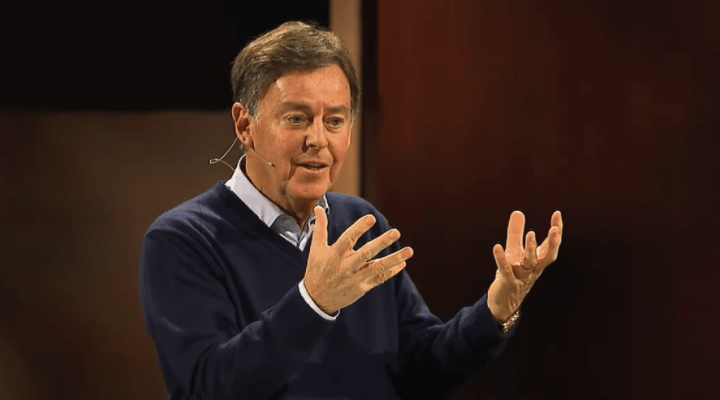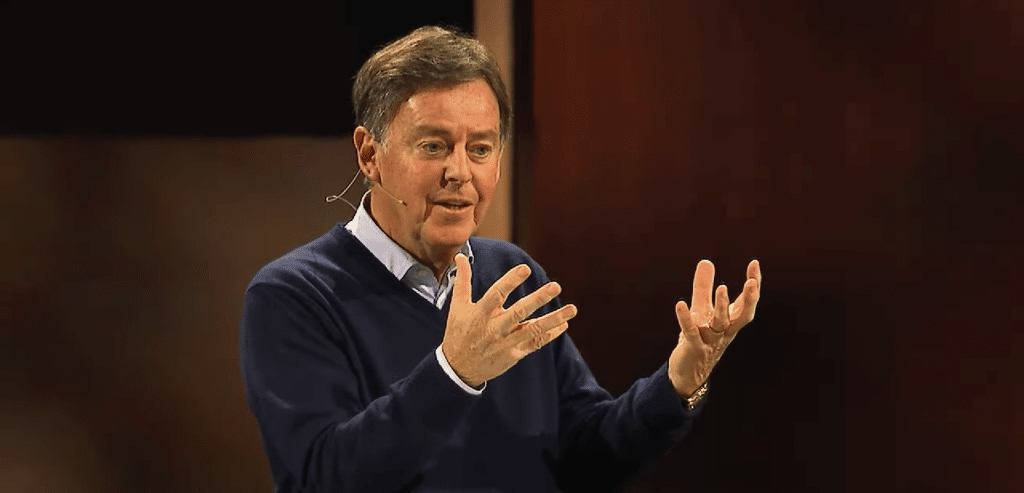“I’m not ready to repent over this. I don’t have to,” Alistair Begg boldly declared in a sermon titled “Compassion vs. Condemnation” at the non-denominational Parkside Church in Cleveland last Sunday.
The accusations being leveled against Begg are that he has caved to the LGBTQ movement after encouraging a grandmother he didn’t know to attend her grandson’s wedding to a transgender person.
Nothing sets off evangelical hardliners like weddings they deem abnormal.
Thus, when some conservatives caught wind of his recommendation, they accused him of affirming sin, and practicing pastoral malpractice to the point of disqualifying himself from ministry. The uproar became so strong that American Family Radio canceled his “Truth For Life” radio program that had been broadcasting for 12 years.
Debate over this one pastor’s comments have set evangelical Twitter on fire.
All of this begs the question: Has the conservative complementarian inerrantist pastor had a recent change of heart regarding sexual relationships?

Who is Alistair Begg?
Although well-known among his tribe, Begg is not likely a household name among most Americans who do not follow the inner workings of evangelicalism and the big business of broadcasting sermons over the radio, TV and internet.
“I’ve always said I am a little bit out of sync with the American evangelical world for this reason. That I am the product of British evangelicalism, represented by John Stott, Martin Lloyd Jones, Eric Alexander, Sinclair Ferguson, Derek Prime,” Begg explained in his sermon. “I have never been a product of American fundamentalism.”
Although Begg has a rather soft-spoken demeanor, his cutting sarcasm began to show its face when contrasting British evangelicalism and American fundamentalism. “I come from a world in which it is possible for people to actually grasp the fact that there are nuances in things. Those of you who are lawyers understand this. Everything is not so categorically clear that if you put one foot out of this box, you’ve got to be removed from the box forever.”
His reference to being removed from the box likely has to do with the cancel culture American fundamentalists often promote by separating from “the world,” false teachers and disobedient brothers in response to God’s holiness.
Despite contrasting himself with fundamentalists, however, Begg affirms fundamentalist doctrines such as biblical inerrancy, penal substitutionary atonement, complementarian gender hierarchies and retributive justice through eternal conscious torment.

The man on the middle cross
In perhaps Begg’s most widely shared presentation of the gospel, he humorously reflects on the idea of the thief on the cross walking up to the gates of heaven following his crucifixion when suddenly he’s met by an angel.
“I can’t wait to find that fellow one day to ask him, ‘How did that shake out for you?’” Begg envisions.
He imagines the angel asking the thief, “What are you doing here?”
Then the thief replies, “Well, I don’t know.”
So the angel asks, “What do you mean you don’t know?”
“Because I don’t know,” says the thief.
At this point, Begg impersonating the angel begins to stutter and goes to get his angel supervisor.
When the angel supervisor arrives, he asks the thief, “Are you clear on the doctrine of justification by faith?” At this point, the congregation is roaring with laughter.
Then the thief replies, “I never heard of it in my life.”
Confused, the angel continues: “And what about, let’s just go to the doctrine of Scripture immediately.”
The thief is just staring.
Then Begg gets to the crux of the matter. “And eventually in frustration (the angel) says, ‘On what basis are you here?’”
“Begg’s gospel presentation seems to pit compassion against condemnation, while siding with compassion.”
With the room so quiet you could hear a pin drop, Begg imagines the thief answering, “The man on the middle cross said I can come.”
This story illustrates a tension in Begg’s theology. On one hand, he believes in a gospel that demands punishment and retribution against vile lawbreakers and requires justification by faith alone. But on the other hand, he humorously sets aside the need for understanding such key conservative evangelical doctrines in exchange for prioritizing the relationship between the thief and Jesus. Just like the title of this past Sunday’s sermon, Begg’s gospel presentation seems to pit compassion against condemnation, while siding with compassion.
And that never goes down well with American fundamentalism.

What did he say to the grandmother?
In the original conversation that set off the firestorm in September 2023, Begg told radio host Bob Lepine a grandmother he didn’t know sent him a long letter that sat on his desk for a long time. In her letter, she asked him, “My grandson is about to be married to a transgender person, and I don’t know what to do about this, and I’m calling to ask you to tell me what to do.”
Begg initially responded with two questions.
- Does your grandson understand your belief in Jesus?
- Does your grandson understand that your belief in Jesus makes it such that you can’t countenance in any affirming way the choices he has made in life?
After the grandmother responded affirmatively to both questions, Begg recommended, “As long as he knows that, then I suggest that you do go to the ceremony. And I suggest that you buy them a gift.”
When the grandmother seemed surprised at his answer, Begg explained: “Your love for them may catch them off guard, but your absence will simply reinforce the fact that they said, ‘These people are what I always thought: judgmental, critical, unprepared to countenance anything.’”

Begg’s middle way
Because Begg identifies as a British evangelical rather than as an American fundamentalist, he wants to approach the topic with more nuance than fundamentalist binaries provide. And because he presents the gospel in a way that emphasizes relational compassion, he wants to apply that in his handling of whether to attend the same-sex weddings of those we love. Given that background, it seems obvious he would try to come up with a third option or a middle way to maintain clarity about his beliefs while pursuing relationship.
“Some people have decided the way to handle it is by admonition. So you just simply stand up and keep telling them, ‘This is terrible. This is terrible. This is terrible,’” Begg explained. On the other hand, he said: “Some people have decided, ‘Well, we just won’t say anything at all, just let it go, who cares, you know it’s a big world, people do different things.’” But Begg countered: “Neither is a possibility for a Bible-believing Christian. We are to treat with honor those who view us with hatred.”

Begg’s dishonoring of LGBTQ people
Despite giving lip service to honoring LGBTQ people, Begg speaks of them in disturbing language. He implies LGBTQ people “view us with hatred.” In Begg’s world, the haters aren’t the white evangelical sexist, homophobic men who control everyone from the top floor of their tower of Babel and fuel insurrections against the United States government. Instead, the haters are LGBTQ people who are in mutual, consenting relationships.
Elsewhere, Begg says LGBTQ people are enemies of the gospel, of Christians and of God. He says Romans 1 teaches “the reality of the finger in the face of God that is represented in those who have turned their backs on God even to the point of their own sexuality being turned upside down.”
LGBTQ relationships “undermine what God says glues societies and families together — the reality of conjugal love in a heterosexual monogamous marriage that produces children,” Begg claims.
And thus, he asserts: “They reject God. They reject his ways. They do it publicly. And they do it in a fashion that makes it absolutely clear that they have no interest in it while mocking Christians as bigots.”
As a result, Begg admits, “Naturally, I do not like them.”

Begg’s justification for attending LGBTQ weddings
In tension with his condemnation of LGBTQ people, Begg preached his sermon about the compassion required for Christians to love their neighbors and enemies as self. “Love your neighbor as yourself, when the category of neighbor includes everyone you meet, including your enemies,” he said. “To do so is a supernatural action. And it is an action that is proof of our salvations.”
Thus, because Begg believes LGBTQ people have postured themselves as the hateful enemies of Christians, Christians are required to love them.
A second example Begg shares is the compassion of the Good Samaritan. “I am not called to walk on past them like the religious leaders in the parable of the Good Samaritan. No, I am called to be like the Samaritan, who is the classic illustration of loving and lending and doing good without a calculator and without the expectation of a payback.”
 Begg also spends significant time in his sermon on the compassion of the Prodigal Son’s father in Luke 15 as a way of pointing to forgiveness.
Begg also spends significant time in his sermon on the compassion of the Prodigal Son’s father in Luke 15 as a way of pointing to forgiveness.
“Unless someone understands the forgiveness of God, and how we are so in the wrong with God — whether you’re a religious Pharisee or whether you’re a lost cause, a drug addict (or) a crazy person — the same grace of God is what woos us and wins us and brings us to himself,” Begg said. “If we do not understand the nature of our predicament, then we never understand the reality of our forgiveness.”
For these reasons, Begg reflected that his most important priority was, “How can I help this grandmother not to lose her granddaughter, who has already publicly turned her back on God and her back on God’s design and in every other way?”
He identifies with a non-affirming grandparent’s internal struggle: “I don’t like this. I’m opposed to this. I do not endorse this. I have no interest in this. But this is my granddaughter.”
The contrast between the unease in his voice when describing how he is opposed to LGBTQ relationships and the deep human plea in his voice when he says, “But this is my granddaughter” is stark.
So he rested his case: “In that conversation with that grandmother, I was concerned about the well-being of their relationship more than anything else. Hence, my counsel. … I answered in that way and I would not answer in any other way no matter what anybody says on the internet as of the last 10 days.”

Begg’s Jeckyll and Hyde gospel
What seems to be happening here is a classic case of the Jekyll and Hyde games the conservative evangelical gospel plays on our humanity.
“Begg denies being an American fundamentalist who lacks nuance, but he provides zero nuance for LGBTQ people.”
Begg denies being an American fundamentalist who lacks nuance, but he provides zero nuance for LGBTQ people.
Begg labels the older brother in Luke 15 as representing “those to whom religion is a matter of merit and its just reward,” but then preaches a gospel that claims, “We’re saved as a result of what Christ has achieved.”
Begg criticizes the older brother for being “harsh, sour, self-righteous and pitiless,” and cuts down fundamentalists for removing people from the box forever, but then preaches a gospel of eternal conscious torment.
Begg claims relationship takes priority over being right, but he interprets justice through the legal lens of penal substitutionary atonement.
He wants to honor LGBTQ people, while telling them they’re a bunch of haters who deserve to go to hell forever.
He attempts to prioritize the grandmother’s relationship with her grandchild, but then presents a theology where God prioritizes exile and punishment.
He talks about how the Prodigal Son claimed he wasn’t worthy to be called a son. And then he tells us how unworthy we all are. But in Luke 15, the father never affirmed his son’s unworthiness. Instead, the father affirmed his presence and blessing.
Begg encourages us to have the compassion of enemy love but preaches about a God who condemns LGBTQ people as enemies.
Begg tells us to have the compassion of the Good Samaritan without using a calculator but preaches about a God who keeps a calculator to make sure he gets payment for every sin by someone.
Begg speaks of the compassion of the Father but preaches about a God whose compassion ends for most people eventually.

Being human or dishonoring our humanity
At some point, Begg and all conservative evangelicals have to come to the realization they can’t honor people they condemn. His sermon title is exactly right. It’s compassion vs. condemnation. His theology is diametrically opposed to the relationships he is attempting to maintain.
“At some point, Begg and all conservative evangelicals have to come to the realization they can’t honor people they condemn.”
Begg seems to get this at an intuitive level. He says, “If I’ve got to go down on the side of one or the other … I’ll go down on the side of compassion with people actually accusing me of just weakness, rather than go down on the side of condemnation, which closes any doors of opportunity for future engagement with those who know exactly what we believe about the Bible and Jesus and about so on.”
Before his final prayer, Begg concludes: “It was not in any way a blanket recommendation to all Christians to attend LGBTQ weddings. … If I was misguided in any way, it was I allowed my grandfatherly hat to take over. It was my personal opinion as I sensed what was best, as I learned about the individual and specific situation.”
But where Begg is misguided isn’t in allowing his grandfatherly hat to take over. His internal struggle is with his humanity wanting to prioritize relationships, while his conservative evangelical theology demands retribution.
And when it comes to the same-sex weddings of those we love, that is our choice as well. Will we choose relationship through engaging each other’s common humanity? Or will we dishonor and dehumanize our loved ones because our violent theology has convinced us we are the ones who are hated?

Rick Pidcock
Rick Pidcock is a 2004 graduate of Bob Jones University, with a Bachelor of Arts degree in Bible. He’s a freelance writer based in South Carolina and a former Clemons Fellow with BNG. He completed a Master of Arts degree in worship from Northern Seminary. He is a stay-at-home father of five children and produces music under the artist name Provoke Wonder. Follow his blog at www.rickpidcock.com.
More by Rick Pidcock:
What grief, denial and fear have to do with the evangelical fascination with Trump | Analysis by Rick Pidcock
Why are conservatives so afraid of Taylor Swift?
What is IHOPKC? Who is Mike Bickle? And what do I need to know?


